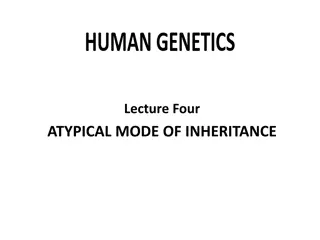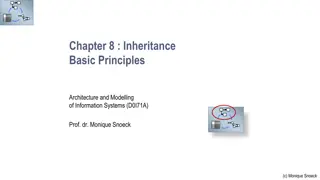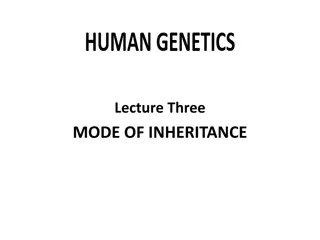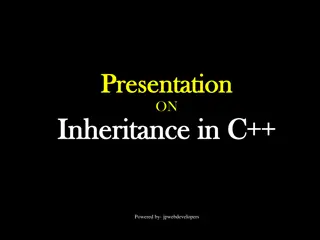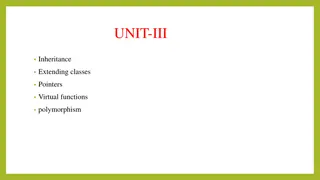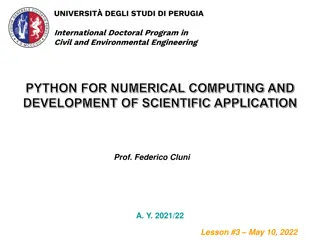Intermediate Concepts in C++ Inheritance - Lecture Participation Poll #24
Explore the advanced topic of C++ inheritance through Lecture Participation Poll #24 in CSE 374. Dive into the concepts with examples and code snippets covering class inheritance, virtual functions, and more. Don't miss out on this opportunity to enhance your understanding of intermediate programming concepts.
Uploaded on Jul 17, 2024 | 0 Views
Download Presentation

Please find below an Image/Link to download the presentation.
The content on the website is provided AS IS for your information and personal use only. It may not be sold, licensed, or shared on other websites without obtaining consent from the author. Download presentation by click this link. If you encounter any issues during the download, it is possible that the publisher has removed the file from their server.
E N D
Presentation Transcript
Lecture Participation Poll #24 Log onto pollev.com/cse374 Or Text CSE374 to 22333 Lecture 24: C++ Inheritance CSE 374: Intermediate Programming Concepts and Tools 1
Administrivia HW 3 posted Friday -> Extra credit due date Wednesday Nov 25th @ 9pm HW 4 posted Tuesday -> Extra credit due date Wednesday End of quarter due date Wednesday December 16 End of quarter due date Wednesday December 16th th @ 9pm @ 9pm CSE 374 AU 20 - KASEY CHAMPION 2
#ifndef BANKACCOUNT_H #define BANKACCOUNT_H #ifndef SAVINGSACCOUNT_H #define SAVINGSACCOUNT_H #include <iostream> #include "BankAccount.h" namespace bank { namespace bank { class BankAccount { public: explicit BankAccount(const std::string& accountHolder); BankAccount(const BankAccount& other) = delete; class SavingsAccount : public BankAccount { public: SavingsAccount(double interestRate, std::string name); double getInterestRate() const; // Accessors int getBalance() const; int getAccountId() const; const std::string& getAccountHolder() const; virtual void withdraw(int amount) override; private: bool isNewMonth(time_t* curTime); // Modifier - add money. void deposit(int amount); double interestRate_; time_t lastMonth_; int numTransactionsInMonth_; }; // different for every type of account, // require derived classes to implement virtual void withdraw(int amount) = 0; } protected: // derived classes can modify the balance. void setBalance(int balance); SavingsAccount.cc #endif private: const std::string accountHolder_; const int accountId_; int balance_; static int accountCount_; }; } #endif BankAccount.cc CSE 374 AU 20 - KASEY CHAMPION 3
#include <iostream> using namespace std; class A { public: A() { cout << "a()" << endl; } ~A() { cout << "~a" << endl; } void m1() { cout << "a1" << endl; } void m2() { cout << "a2" << endl; } }; Self Check // class B inherits from class A class B : public A { public: B() { cout << "b()" << endl; } ~B() { cout << "~b" << endl; } void m2() { cout << A::m2(); << "b2" << endl; } void m3() { cout << "b3" << endl; } }; b() a1 m1. a2 b2 m2. m3. b3 int main() { //B* x = new B(); A* x = new B(); x->m1(); x->m2(); x->m3(); delete x; } CSE 374 AU 20 - KASEY CHAMPION 4
Suppose that You want to write a function to compare two ints You want to write a function to compare two strings - Function overloading! The two implementations of compare are nearly identical! - What if we wanted a version of compare comparable type? - We could write (many) more functions, but that s obviously wasteful and redundant What we d prefer to do is write generic code - Code that is type-independent - Code that is compile-type polymorphic across types // returns 0 if equal, 1 if value1 is bigger, -1 otherwise int compare(const int& value1, const int& value2) { if (value1 < value2) return -1; if (value2 < value1) return 1; return 0; } compare compare for every // returns 0 if equal, 1 if value1 is bigger, -1 otherwise int compare(const string& value1, const string& value2) { if (value1 < value2) return -1; if (value2 < value1) return 1; return 0; } CSE 374 AU 20 - KASEY CHAMPION 5
Polymorphism in C++ In Java: PromisedType var = new ActualType(); - var is a reference (different term than C++ reference) to an object of ActualType on the Heap - ActualType must be the same class or a subclass of PromisedType In C++: PromisedType* var_p = new ActualType(); - var_p is a pointer to an object of ActualType on the Heap - ActualType must be the same or a derived class of PromisedType - (also works with references) - PromisedType defines the interface (i.e. what can be called on var_p), but ActualType may determine which version gets invoked polymorphism is the ability to access different objects through the same interface CSE 374 AU 20 - KASEY CHAMPION 6
Templates in C++ C++ has the notion of templates - A function or class that accepts a type - You define the function or class once in a type-agnostic way - When you invoke the function or instantiate the class, you specify (one or more) types or values as arguments to it - At compile compile- -time time, the compiler will generate the specialized code from your template using the types you provided - Your template definition is NOT runnable code -Code is only generated if you use your template templates type as a parameter CSE 374 AU 20 - KASEY CHAMPION 7
Function Template // returns 0 if equal, 1 if value1 is bigger, -1 otherwise int compare(const int& value1, const int& value2) { if (value1 < value2) return -1; if (value2 < value1) return 1; return 0; } // returns 0 if equal, 1 if value1 is bigger, -1 otherwise int compare(const string& value1, const string& value2) { if (value1 < value2) return -1; if (value2 < value1) return 1; return 0; } #include <iostream> #include <string> // returns 0 if equal, 1 if value1 is bigger, -1 otherwise template <typename T> // <...> can also be written <class T> int compare(const T &value1, const T &value2) { if (value1 < value2) return -1; if (value2 < value1) return 1; return 0; } int main(int argc, char **argv) { std::string h("hello"), w("world"); std::cout << compare<int>(10, 20) << std::endl; std::cout << compare<std::string>(h, w) << std::endl; std::cout << compare<double>(50.5, 50.6) << std::endl; return EXIT_SUCCESS; } CSE 374 AU 20 - KASEY CHAMPION 8
Whats going on? The compiler doesn t generate any code when it sees the template function - It doesn t know what code to generate yet, since it doesn t know what types are involved When the compiler sees the function being used, then it understands what types are involved - It generates the instantiation instantiation of the template and compiles it (kind of like macro expansion) - The compiler generates template instantiations for each type used as a template parameter #include <iostream> #include <string> // returns 0 if equal, 1 if value1 is bigger, // -1 otherwise template <typename T> int compare(const T &value1, const T &value2) { if (value1 < value2) return -1; if (value2 < value1) return 1; return 0; } int main(int argc, char **argv) { std::string h("hello"), w("world"); std::cout << compare(10, 20) << std::endl; // ok std::cout << compare(h, w) << std::endl; // ok return EXIT_SUCCESS; } CSE 374 AU 20 - KASEY CHAMPION 9
Class Templates Pair.h #ifndef PAIR_H_ #define PAIR_H_ Templates are useful for classes as well - (In fact, that was one of the main motivations for templates!) Imagine we want a class that holds a pair of things that we can set and get the value of, but we don t know what data type the things will be Thing is replaced with template argument when class is instantiated - The class template parameter name is in scope of the template class definition and can be freely used there - Class template member functions are template functions with template parameters that match those of the class template - These member functions must be defined as template function outside of the class template definition (if not written inline) - The template parameter name does not need to match that used in the template class definition, but really should - Only template methods that are actually called in your program are instantiated (but this is an implementation detail) template <typename Thing> class Pair { public: Pair() { }; Thing get_first() const { return first_; } Thing get_second() const { return second_; } void set_first(Thing ©me); void set_second(Thing ©me); void Swap(); private: Thing first_, second_; }; #include "Pair.cc" #endif // PAIR_H_ CSE 374 AU 20 - KASEY CHAMPION 10
Pair Function Definition Pair.cpp template <typename Thing> void Pair<Thing>::set_first(Thing ©me) { first_ = copyme; } UsePair.cpp #include <iostream> #include <string> template <typename Thing> void Pair<Thing>::set_second(Thing ©me) { second_ = copyme; } #include "Pair.h" int main(int argc, char** argv) { Pair<std::string> ps; std::string x("foo"), y("bar"); template <typename Thing> void Pair<Thing>::Swap() { Thing tmp = first_; first_ = second_; second_ = tmp; } ps.set_first(x); ps.set_second(y); ps.Swap(); std::cout << ps << std::endl; return EXIT_SUCCESS; template <typename T> std::ostream &operator<<(std::ostream &out, const Pair<T>& p) { return out << "Pair(" << p.get_first() << ", " << p.get_second() << ")"; } } CSE 374 AU 20 - KASEY CHAMPION 11
Abstract Methods & Classes Sometimes we want to include a function in a class but only implement it in derived classes - In Java, we would use an abstract method - In C++, we use a pure virtual function - Example: virtual string noise noise() = 0; virtual string noise noise() = 0; A class containing any pure virtual methods is abstract - You can t create instances of an abstract class - Extend abstract classes and override methods to use them A class containing only pure virtual methods is the same as a Java interface - Pure type specification without implementations CSE 374 AU 20 - KASEY CHAMPION 12
Virtual Functions A virtual function virtual function is a member function that is declared within a base class and is overridden by a derived class, - Ensures correct function is called for object regardless of reference type (facilitate polymorphism) - A method-call is virtual if the method called is market virtual or overrides a virtual method - a non-virtual method call is resolved using the compile-time type of the receiver expression - a virtual method call is resolved using the run-time class of the receiver object (what the expression evaluates to) AKA: dynamic dispatch pure virtual functions - to maximize code sharing sometimes you will need theoretical objects or functions that will be shared across more specific implementations. (EX: bank account is too general to exist, instead you use it to share code across checking account and business account ) - When defining abstract classes sometimes you want to declare a function that must be implemented by all derived classes, you can create a virtual function: - virtual void withdraw(int amount) = 0 ; class C { virtual t0 m(t1, t2, ,tn) = 0; }; CSE 374 AU 20 - KASEY CHAMPION 13
Dynamic Dispatch Dynamic dispatch Dynamic dispatch is the process of selecting which implementation of a polymorphic operation to call at runtime Usually, when a derived function is available for an object, we want the derived function to be invoked - This requires a run time decision of what code to invoke A member function invoked on an object should be the most-derived function accessible to the object s visible type - Can determine what to invoke from the object itself Example: - void PrintStock(Stock* s) { s->Print(); } Calls the appropriate Print() without knowing the actual type of *s, other than it is some sort of Stock Functions just like Java Unlike Java: Prefix the member function declaration with the virtual keyword - Derived/child functions don t need to repeat virtual, but was traditionally good style to do so - This is how method calls work in Java (no virtual keyword needed) - You almost always want functions to be virtual CSE 374 AU 20 - KASEY CHAMPION 14
Dynamic Dispatch Stock.cc #include "Stock.h" #include "DividendStock.h" double Stock::GetMarketValue() const { return get_shares() * get_share_price(); } DividendStock dividend(); DividendStock* ds = ÷nd; Stock* s = ÷nd; // why is this allowed? double Stock::GetProfit() const { return GetMarketValue() GetCost(); } // Invokes DividendStock::GetMarketValue() ds->GetMarketValue(); double DividendStock::GetMarketValue() const { return get_shares() * get_share_price() + dividends_; } // Invokes DividendStock::GetMarketValue() s->GetMarketValue(); // invokes Stock::GetProfit(), // since that method is inherited. // Stock::GetProfit() invokes // DividendStock::GetMarketValue(), // since that is the most-derived accessible function. s->GetProfit(); double "DividendStock"::GetProfit() const { // inherited return GetMarketValue() GetCost(); } DividendStock.cc CSE 374 AU 20 - KASEY CHAMPION 15
Most-Derived Self-Check class A { public: virtual void Foo(); }; void Bar() { A* a_ptr; C c; E e; class B : public A { public: virtual void Foo(); }; // Q1: a_ptr = &c; a_ptr->Foo(); Q1 Q2 A B A. class C : public B { }; // Q2: a_ptr = &e; a_ptr->Foo(); A D B. class D : public C { public: virtual void Foo(); }; B B C. } B D D. class E : public C { }; CSE 374 AU 20 - KASEY CHAMPION 16
How does dynamic dispatch work? The compiler produces Stock.o from just Stock.cc - It doesn t know that DividendStock exists during this process - So then how does the emitted code know to call Stock::GetMarketValue or something else that might not exist yet? - Function pointers!!! Function pointers!!! GetMarketValue() or DividendStock::GetMarketValue GetMarketValue() Stock.h virtual double Stock::GetMarketValue() const; virtual double Stock::GetProfit() const; Stock.cpp double Stock::GetMarketValue() const { return get_shares() * get_share_price(); } double Stock::GetProfit() const { return GetMarketValue() GetCost(); } CSE 374 AU 20 - KASEY CHAMPION 17
vtables and vptrs If a class contains any virtual methods, the compiler emits: - A (single) virtual function table (vtable) for the class - Contains a function pointer for each virtual method in the class - The pointers in the vtable point to the most-derived function for that class - A virtual table pointer (vptr) for each object instance - A pointer to a virtual table as a hidden member variable - When the object s constructor is invoked, the vptr is initialized to point to the vtable for the object s class - Thus, the vptr remembers what class the object is CSE 374 AU 20 - KASEY CHAMPION 18
Dynamic Dispatch Visual CSE 374 AU 20 - KASEY CHAMPION 19
C++ Smart Pointers Wouldn't it be nice if pointers just got delete'd for us? A smart pointer is an object that stores a pointer to a heap-allocated object - A smart pointer looks and behaves like a regular C++ pointer - By overloading *, ->, [], etc. - These can help you manage memory - The smart pointer will delete the pointed-to object at the right timeincluding invoking the object s destructor - When that is depends on what kind of smart pointer you use - With correct use of smart pointers, you no longer have to remember when to delete new d memory! CSE 374 AU 20 - KASEY CHAMPION 20
C++ Standard Libraries C++ s Standard Library consists of four major pieces: - The entire C standard library - C++ s input/output stream library - std::cin, std::cout, stringstreams, fstreams, etc. - C++ s standard template library (STL STL) - Containers, iterators, algorithms (sort, find, etc.), numerics - C+ + s miscellaneous library - Strings, exceptions, memory allocation, localization CSE 374 AU 20 - KASEY CHAMPION 21
Standard Template Library(STL) Containers A container is an object that stores (in memory) a collection of other objects (elements) - Implemented as class templates, so hugely flexible Several different classes of container - Sequence containers (vector, deque, list, ...) - Associative containers (set, map, multiset, multimap, bitset, ...) - Differ in algorithmic cost and supported operations STL containers store by value, not by reference - When you insert an object, the container makes a copy - If the container needs to rearrange objects, it makes copies - e.g. if you sort a vector, it will make many, many copies - e.g. if you insert into a map, that may trigger several copies - What if you don t want this (disabled copy constructor or copying is expensive)? - Use smart pointers! CSE 374 AU 20 - KASEY CHAMPION 22
STL Vector #include <iostream> #include <vector> #include "Tracer.h" A generic, dynamically resizable array - http://www.cplusplus.com/reference/stl/vector/vector/ - Elements are store in contiguous memory locations - Elements can be accessed using pointer arithmetic if you d like - Random access is O(1) time - Adding/removing from the end is cheap (amortized constant time) - Inserting/deleting from the middle or start is expensive (linear time) using namespace std; int main(int argc, char** argv) { Tracer a, b, c; vector<Tracer> vec; cout << "vec.push_back " << a << endl; vec.push_back(a); cout << "vec.push_back " << b << endl; vec.push_back(b); cout << "vec.push_back " << c << endl; vec.push_back(c); cout << "vec[0]" << endl << vec[0] << endl; cout << "vec[2]" << endl << vec[2] << endl; return EXIT_SUCCESS; } CSE 374 AU 20 - KASEY CHAMPION 23
STL iterator #include <vector> Each container class has an associated iterator class (e.g. vector<int>::iterator) used to iterate through elements of the container - http://www.cplusplus.com/reference/std/iterato r/ - Iterator range is from begin up to end i.e., [begin , end) - end is one past the last container element! - Some container iterators support more operations than others - All can be incremented (++), copied, copy-constructed - Some can be dereferenced on RHS (e.g. x = *it;) - Some can be dereferenced on LHS (e.g. *it = x;) - Some can be decremented (--) - Some support random access ([], +, -, +=, -=, <, > operators) #include "Tracer.h" using namespace std; int main(int argc, char** argv) { Tracer a, b, c; vector<Tracer> vec; vec.push_back(a); vec.push_back(b); vec.push_back(c); cout << "Iterating:" << endl; vector<Tracer>::iterator it; for (it = vec.begin(); it < vec.end(); it++) { cout << *it << endl; } cout << "Done iterating!" << endl; return EXIT_SUCCESS; } CSE 374 AU 20 - KASEY CHAMPION 24
STL Algorithms #include <vector> #include <algorithm> #include "Tracer.h" using namespace std; A set of functions to be used on ranges of elements - Range: any sequence that can be accessed through iterators or pointers, like arrays or some of the containers General form: algorithm algorithm(begin, end, ...); Algorithms operate directly on range elements rather than the containers they live in - Make use of elements copy ctor, =, ==, !=, < - Some do not modify elements - e.g. find find, count count, for_each for_each, min_element min_element, binary_search - Some do modify elements - e.g. sort sort, transform transform, copy copy, swap swap void PrintOut(const Tracer& p) { cout << " printout: " << p << endl; } int main(int argc, char** argv) { Tracer a, b, c; vector<Tracer> vec; vec.push_back(c); vec.push_back(a); vec.push_back(b); cout << "sort:" << endl; sort(vec.begin(), vec.end()); cout << "done sort!" << endl; for_each(vec.begin(), vec.end(), &PrintOut); return 0; } binary_search CSE 374 AU 20 - KASEY CHAMPION 25
Questions CSE 374 AU 20 - KASEY CHAMPION 26
RAII char* return_msg_c() { int size = strlen("hello") + 1; char* str = malloc(size); strncpy(str, "hello", size); return str; } "Resource Acquisition is Initialization" Design pattern at the core of C++ When you create an object, acquire resources - Create = constructor - Acquire = allocate (e.g. memory, files) std::string return_msg_cpp() { std::string str("hello"); return str; } When the object is destroyed, release resources - Destroy = destructor - Release = deallocate When used correctly, makes code safer and easier to read using namespace std; char* s1 = return_msg_c(); cout << s1 << endl; string s2 = return_msg_cpp(); cout << s2 << endl; CSE 374 AU 20 - KASEY CHAMPION 27
RAII Example char* return_msg_c() { int size = strlen("hello") + 1; char* str = malloc(size); strncpy(str, "hello", size); return str; } Which do you prefer? Where is the bug? std::string return_msg_cpp() { std::string str("hello"); return str; } using namespace std; char* s1 = return_msg_c(); cout << s1 << endl; string s2 = return_msg_cpp(); cout << s2 << endl; CSE 374 AU 20 - KASEY CHAMPION 28
Compiler Optimization The compiler sometimes uses a return by value optimization or move semantics to eliminate unnecessary copies - Sometimes you might not see a constructor get invoked when you might expect it Point foo() { Point y; // default ctor return y; // copy ctor? optimized? } Point x(1, 2); // two-ints-argument ctor Point y = x; // copy ctor Point z = foo(); // copy ctor? optimized? CSE 374 AU 20 - KASEY CHAMPION 29
Namespaces Each namespace is a separate scope - Useful for avoiding symbol collisions! Namespace definition: - namespace name { // declarations go here } - Doesn t end with a semi-colon and doesn t add to the indentation of its contents - Creates a new namespace name if it did not exist, otherwise adds to the existing namespace (! !) - This means that components (e.g. classes, functions) of a namespace can be defined in multiple source files Namespaces vs classes -They seems somewhat similar, but classes are not namespaces: - There are no instances/objects of a namespace; a namespace is just a group of logically-related things (classes, functions, etc.) - To access a member of a namespace, you must use the fully qualified name (i.e. nsp_name::member) - Unless you are using that namespace - You only used the fully qualified name of a class member when you are defining it outside of the scope of the class definition CSE 374 AU 20 - KASEY CHAMPION 30
Const C++ introduces the const keyword which declares a value that cannot change const int CURRENT_YEAR = 2020; CSE 374 AU 20 - KASEY CHAMPION 31



